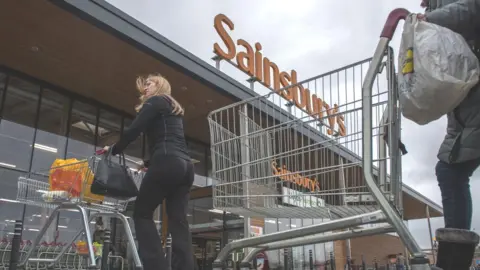Sainsbury's to close 60 Argos stores to cut costs
 Getty Images
Getty ImagesSainsbury's is shutting another 60 to 70 Argos shops and moving them inside its supermarkets as part of a reorganisation.
It will also close up to 15 supermarkets and 40 convenience stores.
The closures are part of a plan to reduce costs by £500m over five years, it said.
However Sainsbury's also plans to open around 120 new grocery outlets, mostly convenience stores.
The supermarket did not say where the closures would be, but said all Argos staff would be relocated.
The plans were announced as Sainsbury's warned investors profits had dipped over the last six months.
It blamed bad weather and higher marketing costs for the forecast £50m drop on the period last year.


Sainsbury's has been under pressure to show that its business is on track after the collapse of its plan to merge with Asda.
Overhauling its large store estate is part of the new plan.
It was clear when Sainsbury's bought Argos in 2016 that hundreds of Argos stores would be closed and relocated into Sainsbury's stores.
This integration is now well underway. There are now some 290 Argos stores inside a Sainsbury's shop - half of these are relocations.
Sainsbury's is keen to point out that ultimately, it'll end up with as many as 100 more shops overall, including a net loss of around five supermarkets.
There's no detail today on where the openings and closures could be, nor how many roles will be affected, only that it hoped to boost operating profits by £20m a year through the changes.
Sainsbury's is now on a mission to cut costs, some £500m, over the next five years. It's got a tricky balancing act ahead as it tries to cut prices to fend off the discounters and improve its profitability.

The supermarket will also cease new mortgage sales as part of a plan to make its financial services division more profitable.
Earlier this month, larger rival Tesco sold its entire mortgage portfolio to Halifax, exiting a very competitive market. Low interest rates have made mortgages less profitable for lenders.
These moves add weight to the view that offering banking services is becoming a lower priority for the supermarkets, the BBC's personal finance reporter, Kevin Peachey said.
"The big grocery stores were often talked of being the main challengers to the established High Street banks, given customers' brand loyalty and an existing "branch" network," he said.
Value brands
Sainsbury's reported sales for the three months to 21 September for stores open at least a year and excluding fuel dropped 0.2%. Clothing and food sales rose, while household goods sales dropped 2%.
A fall in its pension deficit means it can reduce its contributions by £50m a year.
"We have focused on reducing prices on every day food and grocery products and expanding our range of value brands, which have been very popular with customers," said Chief Executive Mike Coupe. "At the same time, we are investing significantly in our supermarkets."
Fewer items on promotion and fewer new video game and toy releases hurt sales at Argos, he said, while Sainsbury's Tu brand of clothing performed well.
'Few tweaks'
Sainsbury's has been under pressure to come up with a "plan B" after its failed attempt to buy Asda earlier this year. It had argued the tie-up was necessary to cut costs and improve its buying power so it could reduce prices to counter the rise of the discounters.
Mr Coupe told investors that Sainsbury's could thrive on its own and the reorganisation represented a continuation of his existing strategy with a "few tweaks" along the way.
"We're more competitive than we've ever been," Mr Coupe said.
"We are confident in our ability to sustainably fund investment in the customer offer."
Sainsbury's is hoping to generate an extra £20m a year in operating profit with the overhaul of its store estate.
New convenience stores will be more targeted to what shoppers want, it said. For instance, in London and other city centre locations, outlets will have more "food-to-go".
It also wants to open around ten larger convenience stores, containing Argos services, in more suburban locations.
Sainsbury's has been cutting prices on some daily essentials as well as launching new budget brands , like J James meat, fish and poultry, as they try to match the success of Asda and Tesco's new own-brand ranges.
